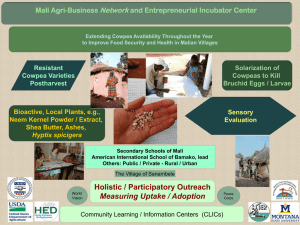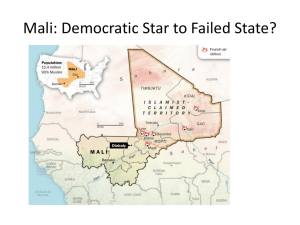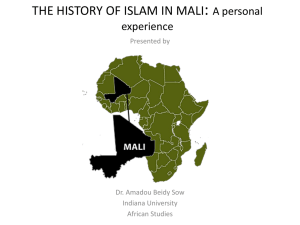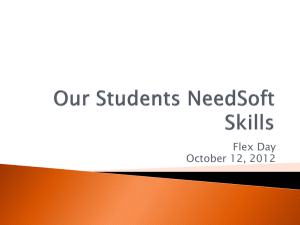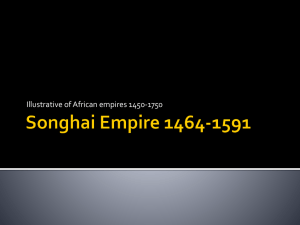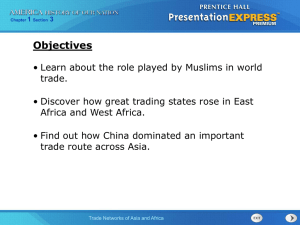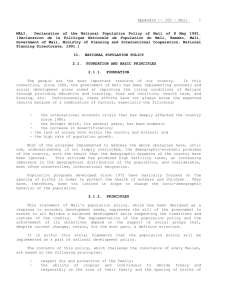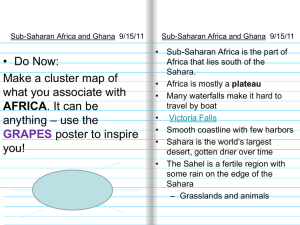Recent Major Events
advertisement
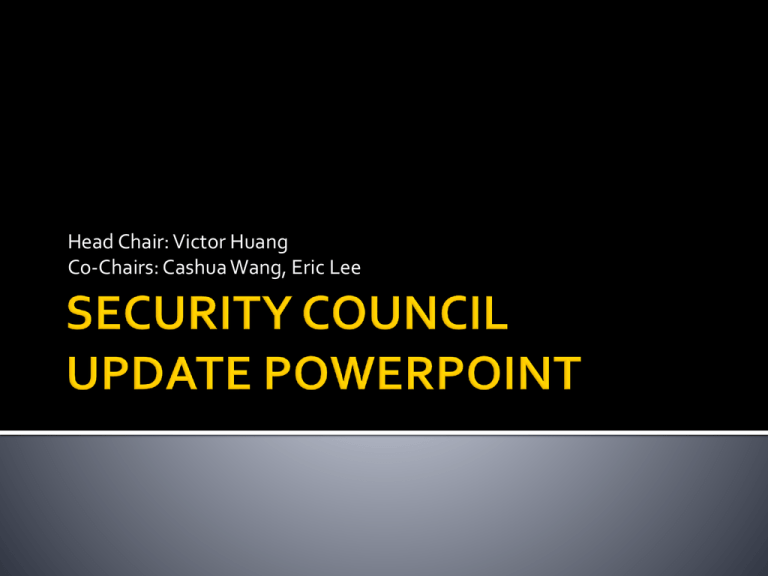
Head Chair: Victor Huang Co-Chairs: Cashua Wang, Eric Lee Chair: Cashua Wang French air strikes kill Mali rebel commander Omar Ould Hamaha Hamaha was part of the coup that deposed of the Malian president in 2012. An outspoken leader for the Ansar Dine, the US and France recognized him as a terrorist. 10-12 other suspected Islamic militants were killed alongside Hamaha during French-Malian counter-terrorism strikes. Parts of Franco-German brigade deployed to boost Malian security Under the European Union (EU), the Franco-German brigade intends to integrate into the EU mission in Mali (EUTM). As per the EUTM’s goals, the Franco-German brigade will aid in training Malian soldiers. Around 1,600 French troops remain in Mali with 3000 EUTM trained Malian soldiers. Jihadists return to Northern Mali a year after Operation Serval Operation Serval is an ongoing military operation in Mali by the French air force and army. Following SC Res 2085, the operation’s goal is to oust Islamist militants from Mali. The AQIM continues to target families either hostile to Islamist presence in Northern Mali or friendly and helpful to French presence. Targeted people include, particularly, Tuareg members of the National Movement for the Liberation of Azawad (MNLA). French, Chadian, and Malian troops continue to fend off attacks by suicide bombers, mines, and/or arms even with the MINUSMA presence of 6000 UN Peacekeepers. The AQIM, MUJAO, and Ansar Dine remain particularly prominent in Northern Mali. Al-Qaeda linked Islamic militants (MUJAO) kidnap 5 Mali Red Cross workers The members are alive and in good health according to a MUJAO spokesman. All 5 members are Malian citizens. Question to consider (QTC): How should countries ensure safety of NGO workers while providing aid in Mali and the Sahel region? Drought remains a major issue in the Sahel region Drought leads to food insecurity. Around 20 million people face food insecurity and malnutrition in the Sahel region. Many people have fled Mali to other countries due to the drought and conflict, creating a major refugee problem for surrounding countries. QTC: How should nations support and stabilize Mali concerning drought, famine, and refugee issues? Mali: The Malian government is strongly democratic. In contrast, numerous rebel groups are Sharia-law supporting Islamist militants. The current Malian government fights against the rebel groups but lacks the resources to do so successfully, hence, the need for a French intervention and UN Peacekeeping mission. France As an ex-colonial ruler, France strongly supports military intervention to support Malian security. Mali remains a crucial geographical location for France and Europe in maintaining military bases and defending against terrorist attacks. Mali also has rich deposits of gold and uranium. France strongly supports the current democratic Malian government and does not support the rebels. Middle Eastern Nations Oceania • Iran has promised support for Mali in ending the conflict and is interested in working with the African Union to end the conflict. Asia China is highly invested in Mali monetarily and supports the Malian government, having several thousand peacekeepers in Mali. Having historically close ties with Europe, Australia and New Zealand also support the Malian government, with New Zealand providing small funds for the humanitarian effort in Mali. Americas The US supports Malian ventures in re-establishing a democratic government as well as supporting the French foreign intervention. However, the US is not as highly invested in Mali, and suspended military aid during the interim government in Mali after the coup. African Union (AU): The AU supports the Malian government in fighting against the Islamist militants, a major problem occurring in other parts of Africa. AFISMA was started by the AU to support Mali in regaining security. Very flexible in working with other nations. European Union (EU): The EU likewise supports the Malian government, and has sent the EUTM mission to train Malian government soldiers. Military intervention is strongly supported. Very flexible in working with other nations concerning Mali. UNSC P5 For once, the UN P5 are in one accord concerning ending the Malian conflict. The P5 are also in support of the previous French military intervention. Chair: Eric L. 2013 December - US and Britain suspend "nonlethal" support for rebels in northern Syria after reports that Islamist rebels seize some bases of Western-backed Free Syrian Army. 2014 January-February - UN-brokered peace talks in Geneva fail, largely because Syrian authorities refuse to discuss a transitional government. 2014 March - Syrian Army and Hezbollah forces recapture Yabroud, the last rebel stronghold near the Lebanese border. UNITED NATIONS —the plight of civilians has not improved and that millions remain in dire need since the Security Council united in demanding better aid. Valerie Amos told reporters after her private briefing to the 15-nation council that the situation for millions of desperate Syrians has not gotten better and will not improve unless there is “full and unhindered access.” “I told the Council that we need to see a significant step-change in the speed and scale of humanitarian aid, if we are to save lives and keep pace with the evergrowing needs," she said. "This piecemeal approach, despite the best efforts of humanitarian workers on the ground, is not delivering change fast enough.” On February 22, the SC unanimously adopted a resolution demanding both sides end attacks on civilians, including 1. the use of barrel bombs 2. give unhindered access to humanitarian relief operations 3. end sieges on cities and towns 4. lift bureaucratic obstacles 5. allow aid convoys to cross conflict lines and international borders to reach the 3.5 million needy Syrians in hard-to-reach areas The stalled Middle East peace process and Syria’s civil war dominated opening talks at the 25th Arab League Summit, which got under way in Kuwait. Following an opening recitation from the Quran, the emir of Qatar, Sheikh Tamim bin Hamad al-Thani, whose nation chaired last year’s meeting, called on Israel to withdraw completely from all Arab territories. The secretary-general of the Arab League, Nabil alArabi, later applauded U.S. efforts to forge peace in the region, but blamed Israeli settlement expansion and other policies for the stalemate. USA: The United States could not have stopped the humanitarian crisis in Syria with military strikes, President Barack Obama said U.S. troops had reached their limits after long wars in Iraq and Afghanistan. U.S. Ambassador Samantha Power said President Bashar al-Assad’s regime is the biggest obstacle to the delivery of aid. China and Russia: Both countries recently agreed unanimously with the SC members on allowing “unhindered humanitarian access” to cities, towns, and neighborhoods under siege by warring factions. However, no armed intervention is necessary. Syria: Assad is quietly preparing the ground to hold elections by early this summer to win another 7-year term, even as the Syrian conflict rampages into its fourth year with large parts of the country either in ruins or under opposition control and nearly a third of the population scattered by civil war. Syria has not yet disposed all chemical weapons and still has great issues in delivering aid. A French peacekeeper patrols Bangui, Jan. 2014 Victor Huang Jan 10th – President Michael Djotodia and Prime Minister Nicolas Taingaye resign* Jan 23rd – Catherine Samba-Panza (previously mayor of Bangui, the capital of the CAR) assumes the position of interim President. Ban Ki-Moon approves of this appointment, since Samba-Panza was viewed by many as being neutral and away from clan-clashes. Her arrival to presidency has generally been accepted by both anti-balaka and ex-Seleka forces. Above: Catherine Samba-Panza being swarmed by reporters *this is so important I’ve decided to put it in again!!! Djotodia used to be the leader of the Seleka organization! January – the European Union promised to send 1000 additional troops to the CAR. Feb 18th – Ban Ki-Moon called on the Security council to immediately deploy 3000 troops in the nation to combat “innocent civilians being targeted and murdered”. Ban outlined a plan which included sending 3000 more peacekeepers in addition to the 6000 African Union soldiers and 2000 French soldiers already stationed in the CAR. March 29th– the European Union announced in a news release that it is beginning to launch a military operation to restore stability. The forces will be known by the acronym EUFOR RCA and will operate primarily in the capital city of Bangui. This is authorized by the Security Council Resolution 2134, and the force is anticipated to contain 800-1000 people. April 3rd – Chad announced it would pull out its 850 troops stationed in the CAR, because these troops have been accused of siding with Muslim militias (ex-Seleka) in sectarian clashes with Christians (antiBalaka). The Chadian troops had also been previously reported to have killed at least 24 people in the CAR. A French Peacekeeper patrols Bangui Europe: Africa: The African Union currently has 8000 troops stationed in the CAR. Many nations surrounding the CAR (such as Gabon, Cameroon, Angola, South Africa, and the Republic of Congo) currently have sent additional military aid. If you are an African nation, you most likely support helping out the CAR. Chad: If you are a European nation, chances are you’re probably FOR sending some sort of peacekeeping group into the CAR to help out the situation. France has already stationed about 2000 troops within the CAR (which is its ex-colony), and the EU has very recently announced they will be sending additional troops to help out the situation. A tricky situation. With the recent announcement of the pull-out of Chadian troops, while Chad as a nation may not be willing to continue contributing militarily, it definitely does not want to see the conflict spilling over into your borders. Asia/Latin America: So far there hasn’t been a strong stance on this issue. Such nations are most likely neutral in regards to this matter; they don’t want to see the conflict spread but won’t pledge to devote their own resources to solving it. The Central African Republic has descended into its current bloody conflict for months already. UN and Humanitarian Agencies report that: 15 1000 people have been killed. More than 1,000,000 people have been displaced out of the CAR’s population of 4,500,000, as a result of this more than conflict. 2.5 More than million people are in need of immediate humanitarian assistance. Best of luck, delegates! -Victor, Cashua and Eric
